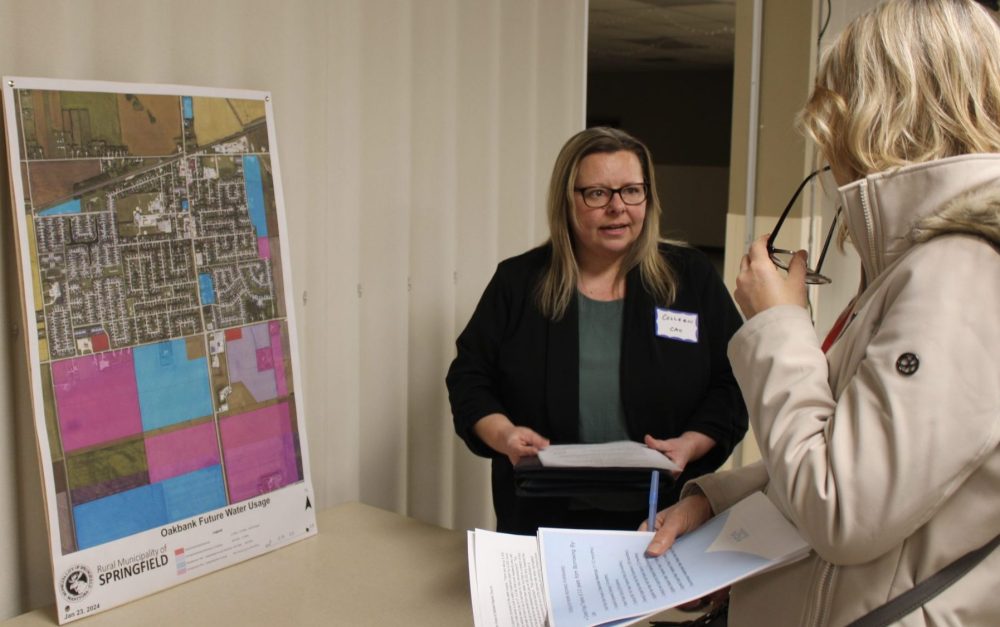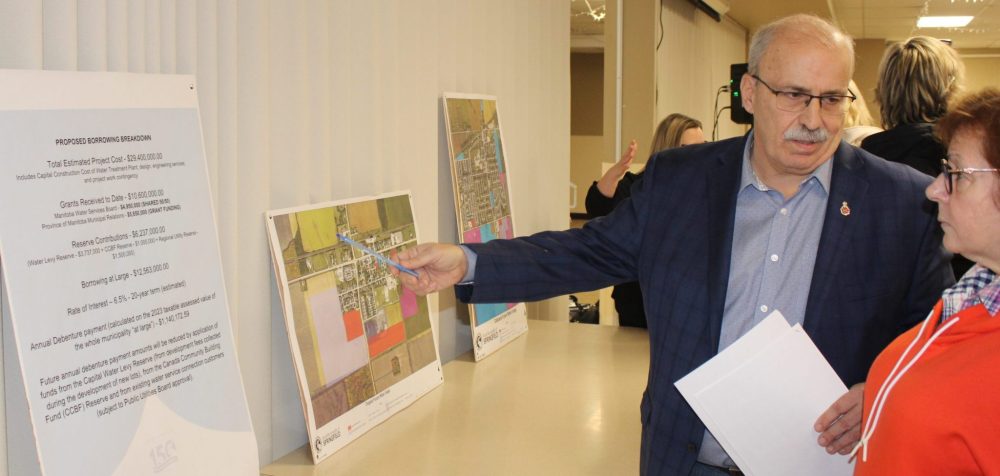Springfield divided on water treatment plant
Advertisement
Hey there, time traveller!
This article was published 29/01/2024 (525 days ago), so information in it may no longer be current.
An open house to offer information on the RM of Springfield’s planned water treatment plant and supply expansion project revealed a community divided on whether they even need the change and just who should be paying for it.
The second hearing on the subject, reference was made to the first in Dugald which some attendees say devolved into chaos with those present shouting over each other with comments and questions.
“We don’t want another Dugald here,” Mayor Patrick Therrien said to the full house in the basement of the Oakbank Baptist Church on Tuesday, making an appeal for questions to be asked in a “respectful” matter.

Poster boards and handouts revealed the scope of the project and for the first time residents were told what the planned borrowing would mean for their tax bills.
The project itself has many phases. It will include the design and construction of the new Dugald – Oakbank water treatment plant, the upgrade of the existing Dugald and Oakbank water treatment plants, upgrades of existing pumps and installation of back-up power to the Dugald raw water field, development of new raw water wells at the Dugald water field, increase of the raw water pipeline capacity from Dugald raw water field to the new treatment plant, construction of a new pipeline from the new plant to Dugald and Oakbank and decommission of the existing Heatherdale raw water well field.
This will increase the operating capacity by the equivalent of 15,000 persons and will introduce a new treatment process which will include reverse osmosis, filtration and chlorination.
Those in attendance questioned the need for such a large project which is estimated to cost $29.4 million.
A two-page paper distributed at the meeting by Janet Nylen questioned why a rural municipality wants to become a large urban suburb of Winnipeg, calling the expansion premature.
The RM shared a detailed borrowing breakdown with those in attendance.
Of the $29.4 million total project cost, $10.6 million has been received in provincial grants from the Manitoba Water Services Board and Province of Manitoba municipal relations.
A total of $6.2 million will come from reserves including the water levy reserve, CCBF reserve, and regional utility reserve.
That will leave nearly $12.6 million to be paid for by taxpayers which is anticipated to be borrowed at 6.5 percent interest and paid over 20 years.
Future annual debenture payment amounts will be reduced by application of funds from the Capital Water Levy Reserve of which development fees will become due on projects approved and already allocated. It’s estimated that an additional $4 million will come in through that route.
The initial debenture will be paid for by residents at a mill rate of 0.686.
That means for every $100,000 in farmland it will add $17.83 to taxes annually, for every $100,000 in residential it will add $30.87 and for every $100,000 in commercial it will cost $44.59.
It was those costs to rural people and those who will not directly benefit that drew the most opposition.
One member of the crowd questioned why they, a farmer, should pay. “It’s bullshit,” he added before being chided by Mayor Patrick Therrien.
Because the new plant will pave the way for more development, many echoed the same sentiments.

“Why are you making the residents pay for this development that none of us are going to use?” a resident asked.
Mayor Patrick Therrien said this is a positive move for the municipality.
“It’s going to allow Oakbank to expand, Dugald to expand, but it’s also going to allow the taxpayer base to increase exponentially and more tax base, more businesses, that will affect our taxes as well,” he said.
Benefits outlined by the municipality include providing additional capacity to subdivisions in Dugald and Oakbank, providing water supply to existing properties in Oakbank currently on wells, benefitting schools and care homes, increasing firefighting capacity to the entire RM, the potential to reduce urban house insurance, and to provide water supply to future planned seniors’ residences, a new recreation centre and new schools in Dugald and Oakbank.
Council is not united in support for the funding model for this project.
Councillors Mark Miller and Andy Kuczynski both have concerns.
“I see concern with people living in the rural areas that they would be taxed the same as those who are going to be most benefitting from this,” Miller said.
He said he considers the new plant essential, and said rural areas also get some benefit through fire protection, schools and businesses, but wants a formula that’s going to be fair.
“I hear concerns in my ward, which is strictly rural from Pine Ridge to Cooks Creek to Hazelridge, that there’s no direct benefit,” he said. “I think we need to look thoroughly to see if there could be another formula to make this more palatable for all the residents of Springfield that they all feel there’s a buy-in and they all benefit,” he said.
Attendees were also urged to write down their questions and leave them with RM staff. Answers will be posted to their website.
The project which has been talked about for more than a decade began to gather speed in 2021 when it was officially initiated.
Tenders are scheduled to be issued in spring with construction expected to begin later this year.
